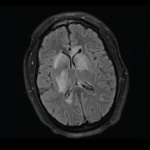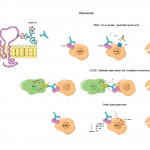Laura Coates, MBChB, MRCP, PhD, described & compared the intricacies of different outcome measures, as well as implications for clinical practice & trials, for patients with psoriatic arthritis.


Laura Coates, MBChB, MRCP, PhD, described & compared the intricacies of different outcome measures, as well as implications for clinical practice & trials, for patients with psoriatic arthritis.

In ongoing work to validate data-driven outcome tools for clinical investigation in large vessel vasculitis, an international team of rheumatologists from the Outcome Measures in Rheumatology (OMERACT) Vasculitis Working Group has published a report on subclinical disease activity and patient perspectives on therapy response…

Teresa Sosenko, MD, Anca Musetescu, MD, PhD, Neha Gandhi, MD, Scott Friedstrom, MD, & Diana Girnita, MD, PhD |
Systemic lupus erythematosus (SLE) is an autoimmune-mediated rheumatic disease characterized by multisystem involvement that can cause significant morbidity and mortality. Acute disseminated encephalomyelitis (ADEM) is a rare, fulminant, autoimmune-mediated, demyelinating disease involving the white matter of the central nervous system (CNS), and is considered a manifestation of neuropsychiatric lupus. Few reported cases involve SLE and…

Catherine Kolonko |
According to a large cohort study of pediatric patients, rituximab use is on the rise in the treatment of children diagnosed with vasculitis. Treatment with cyclophosphamide remains common, but it’s beginning to wane. Dialysis and mechanical ventilation also remain common, the study indicates. The retrospective study of hospitalized children in the U.S. included the largest…

Nan Yang, PharmD, & Kurt Oelke, MD, on behalf of the ARHP Practice Committee |
Two decades have passed since the first biologic disease-modifying anti-rheumatic drug (bDMARD) was approved. Studies on the long-term use of biologics in different disease states, such as for cardiovascular disease (CVD) and malignancy, as well as for knee/hip replacement, reveal some encouraging news. In clinical trials, bDMARDs have been shown to increase the risk of…

Bisphosphonate Drug Holidays Drug holidays are common for patients on bisphosphonate therapy. Often, these breaks in treatment are related to known U.S. Food and Drug Administration (FDA) warnings and drug class adverse effects. Currently, data on fracture risk related to drug holidays are limited. In recent research highlighted at the 2017 ACR/ARHP Annual Meeting ,…

Usman T. Malik, MBBS |
The Presentation A pale, quiet woman—her mother—wheeled the girl into my clinic. It was a blistering Florida day, and the girl was shivering. She glanced up at me when I said hello and asked her name. “Hi,” she said, giving me a broad smile. Her smile was the only broad thing about her. Her elbows…

A recent epidemiologic study of patients with systemic lupus erythematosus (SLE) investigated racial and ethnic differences in the risk for cardiovascular disease (CVD). Among SLE patients enrolled in Medicaid, the risk for myocardial infarction (MI) was lower in Hispanics and Asians compared with whites, and the risk of stroke was higher in blacks and Hispanics…

Larry Beresford |
A recent prospective, observational cohort study of potential clinical biomarkers for progression to interstitial lung disease (ILD) in patients with early systemic sclerosis (SSc) found that higher levels of CCL2 circulating in their plasma predicted both faster ILD progression and poorer survival rates than in those with lower levels.1 CCL2, also known as monocyte chemoattractant…

Rick Brasington, MD |
A number of autoinflammatory syndromes that result from genetic mutations have been described recently. The vast majority occur in children. However, three periodic fever syndromes are important for rheumatologists who treat adults to know about. The goal of this review is to provide a concise description of each condition, and to help the clinician understand…